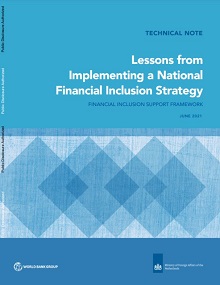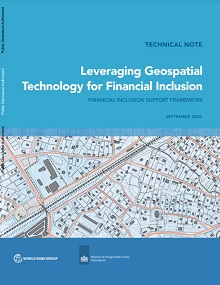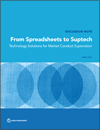
A national financial-inclusion strategy (NFIS) helps policy makers, in coordination with a wide range of stakeholders, define objectives and outline a set of impactful, sequenced actions to accelerate progress toward achieving financial-inclusion goals. Achieving greater financial inclusion requires a deliberate, coordinated approach to identify barriers and opportunities, and a platform for diverse stakeholders to coordinate efforts to achieve shared financial-inclusion objectives. NFIS implementation typically involves operationalizing governance arrangements to oversee implementation, establishing a framework for monitoring and evaluation (M&E) to capture progress regularly, implementing action plans to achieve financial-inclusion targets, and making necessary adjustments to address changing landscapes. In 2018, the World Bank Group (WBG) released a toolkit that provides financial-sector authorities and other stakeholders with practical guidance on developing and operationalizing an NFIS. After launching an NFIS, many factors influence and shape progress and success, and no two countries travel the same path during NFIS implementation. This note aims to build on existing NFIS knowledge by sharing insights that have helped improve implementation postlaunch. When used together with the WBG NFIS Toolkit, this note aims to support countries that are working to draft, launch, and implement an NFIS effectively.

Geospatial technology can be used to map financial access points and assess the distribution of financial services across space, allowing authorities to identify gaps in existing coverage clearly and with much higher precision than is otherwise possible. It can also help to prioritize gaps with respect to various policy objectives as well as design appropriate policy interventions at a subnational level. This note provides financial sector authorities and other stakeholders practical guidance for leveraging geospatial tools to inform financial inclusion policymaking. It draws from the work conducted in Ethiopia, Mozambique and Pakistan under the Financial Inclusion Support Framework (FISF) program.

Developing a national financial inclusion strategy (NFIS) can help countries chart a clear and coordinated path toward greater financial inclusion. This toolkit provides practical guidance on developing and operationalizing a NFIS. The toolkit draws on over 20 country experiences and is informed by the World Bank Group’s role as a technical partner in NFIS development and operationalization in a diverse range of country contexts.
This three-day training guided financial sector authorities from 14 countries through developing and operationalizing a National Financial Inclusion Strategy (NFIS). The training covered the overall NFIS development process, the key content for an NFIS document, and operationalizing an NFIS following its launch. Financial sector experts from the World Bank Group will also provide technical sessions on key NFIS policy areas, including digital payments, fintech, credit infrastructure, financial consumer protection and agricultural finance.